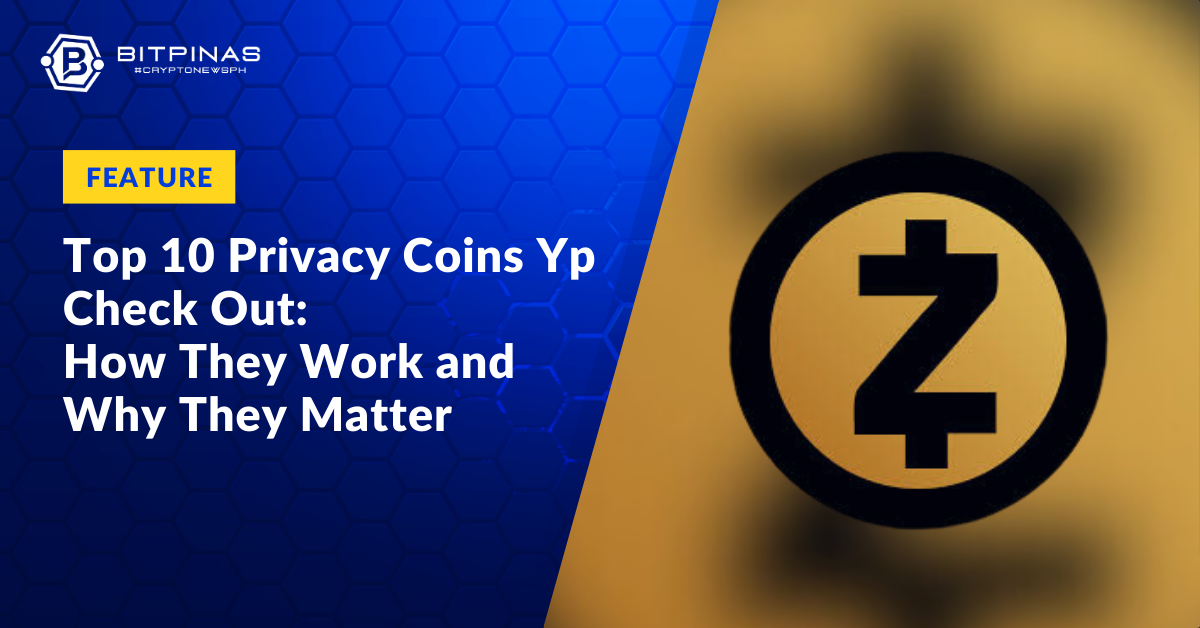Disclaimer: This article is for informational purposes only and does not constitute financial advice. BitPinas has no commercial relationship with any mentioned entity unless otherwise stated.
📬 Get the biggest crypto stories in the Philippines and Southeast Asia every week — subscribe to the BitPinas Newsletter.
While blockchain technology delivered a more transparent and permanent record of transactions, there are still users who want the ability to conduct transactions securely and anonymously, and the same technology has made it possible.
What Are Privacy Coins
Privacy coins are a type of cryptocurrency designed to make transactions anonymous, including who sent the funds, who received them, and how much was sent.
It is far different from major tokens like BTC and ETH because these tokens, when transacted, will not be openly visible on a public ledger like Bitcoin and Ethereum.
Features of Privacy Coins
To do this special feature, privacy coins add “cryptographic tricks,” so transaction details stay hidden. Four common tricks are used.
The first one is through ring signatures. It mixes the real signature of the sender with other signatures, so no one can tell who did the transaction.
The second one is through stealth addresses. It is where each payment will have a one-time address only to hide the receiver’s main address.
The third one is through zero-knowledge proofs, or zk‑SNARKs. This uses cryptographic proofs that let a network verify a transaction is valid without revealing the details.
And the last one is through coin mixing, or tumblers. It shuffles many transactions together to make the trail confusing.
The Top 10 Privacy Coins of 2025
Arranged alphabetically
| Privacy Coin | Ticker | About the Token |
| Beam | BEAM | Uses the MimbleWimble protocol to hide amounts and simplify transaction data. |
| Dash | DASH | Has a mixing feature called PrivateSend that mixes coins to increase transaction privacy. |
| Firo, formerly Zcoin | FIRO | Uses coin‑mixing and other privacy tech to break transaction links. |
| Grin | GRIN | Uses MimbleWimble for lightweight, privacy-focused transactions with minimal on-chain data. |
| Haven Protocol | XHV | Built on Monero tech with extra features for private tokenized assets and storage. |
| Horizen | ZEN | Supports optional zk‑SNARK shielded transactions and sidechain privacy tools. |
| Monero | XMR | Uses ring signatures, stealth addresses, and confidential transactions to make sender, receiver, and amounts private. |
| Pirate Chain | ARRR | Enforces privacy by default using zk‑SNARKs so nearly all transactions are shielded. |
| Secret Network | scrt | Uses encryption so dApp data and transactions stay private. |
| ZCash | ZEC | Offers optional shielded transactions using zk‑SNARKs so users can hide details when they choose. |
The Challenges of Using Privacy Coins
While privacy coins offer personal financial privacy to their users, protecting them from unwanted surveillance or doxxing, using these assets can still be challenging.
Because of censorship resistance, of course, it is harder for regulators to block or freeze funds made through private transactions; thus, when a user chooses to transact using a privacy coin, suspicions that they are hiding something from the government could rise.
It is because privacy coins are also often used in illicit activities, alerting the regulators more.
This could result in regulatory pressure, as there is a possibility of regulators requiring local exchanges to not list these tokens in line with anti-money laundering laws.
Closing Thoughts
Overall, it should be noted that using privacy coins is still legal. There is still no regulation that prohibits using it.
But remember, always aim for a common good: Do not abuse the best available technology for personal interests.
This article is published on BitPinas: Top 10 Privacy Coins in 2025: How They Work and Why They Matter
What else is happening in Crypto Philippines and beyond?









